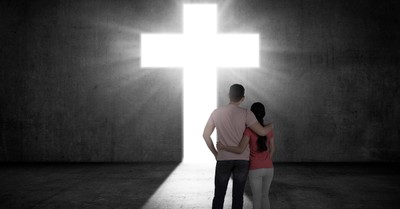What It Really Means to Be Made in the Image of God - The Crosswalk Devotional - September 13
The Crosswalk Devotional


Audio By Carbonatix
By Deidre Braley, Crosswalk.com
What It Really Means to Be Made in the Image of God
By Deidre Braley
Bible Reading:
So God created mankind in his own image, in the image of God he created them; male and female he created them (NIV). – Genesis 1:27
The verse from Genesis about God creating mankind in his own image is a clear fan-favorite among Christians. It is often interpreted from an individualistic perspective as a way to applaud our innate gifts. People look at their own unique skills, qualities, and personality traits and consider them inherited attributes from God.
And while this view certainly holds value, it’s important to also understand that that’s not all there is to the story. See, when the Bible says that God made humankind in his image, it doesn’t only mean that he gave people a similar spirit or likeness to his own. It also means that he gave them a purpose and responsibility. Let me explain.
In Ancient Near Eastern cultures, kings would create royal statues of themselves—replicas of their own likeness that they could place throughout their empires to demonstrate their dominion even when they couldn’t physically be there. Given this context, the ancient audience of the Bible would have understood that when the author of Genesis said, “So God created mankind in his own image…” it meant that God had, in a similar sense, created humankind as a visible representation of himself when he could not be seen otherwise on earth.
Bible scholar Richard Hess explains it this way:
…at the completion of God’s creation, he left ʾādām as his image to represent his authority on earth. This suggests that the function of the image is to reflect the divine will on earth in such a way as to extend God’s kingdom into every area of nature, society and culture. This is exactly what happens with the first man in Genesis 2 (“Adam,” in Dictionary of the Old Testament: Pentateuch, p. 39).
So what does this mean for us? In a world where nihilism runs rampant and many question whether their lives hold any value or purpose, this interpretation of Genesis 1:27 hands us a dazzling mission: to reflect God’s divine goodness in a world that craves light. We are not meant to just build our individual nests and keep to ourselves; we are meant to bring order, kindness, peace, and love into every corner we can reach.
Intersecting Faith & Life:
Today, take a couple of minutes to prayerfully consider the following questions:
Am I using my unique skills and giftings to build myself up, or am I using them to magnify God and reflect his goodness back into the world?
What would it look like for me to reflect God’s divinity in my home? to my neighbors? in my children’s school? in my workplace? in my online interactions? in my unique area of influence?
How can I take one step toward doing that today?
Further Reading:
To learn more about God’s intended purposes and responsibilities for humankind—and also what happens when humans don’t follow that path—consider reading the following chapters from Scripture:
On Being Salt & Light: Matthew 5:13-16
The Story of the Tower of Babel: Genesis 11:1-9
An Excerpt from Ezekiel: Ezekiel 15
Photo Credit: ©GettyImages/leolintang
 Deidre Braley is a wife and mother to three children. She is the author and host behind The Second Cup, a collection of essays, poems, and podcast episodes where holiness and humanity collide. She recently published her debut poetry collection, The Shape I Take. Deidre is an editor with The Truly Co, and a contributor for The Way Back to Ourselves and Aletheia Today, among others. Her ideal day is spent eating chocolate croissants and having long chats about writing, dreams, and theology. Connect with Deidre on Instagram @deidrebraley.
Deidre Braley is a wife and mother to three children. She is the author and host behind The Second Cup, a collection of essays, poems, and podcast episodes where holiness and humanity collide. She recently published her debut poetry collection, The Shape I Take. Deidre is an editor with The Truly Co, and a contributor for The Way Back to Ourselves and Aletheia Today, among others. Her ideal day is spent eating chocolate croissants and having long chats about writing, dreams, and theology. Connect with Deidre on Instagram @deidrebraley.
Check out fantastic resources on Faith, Family, and Fun at Crosswalk.com!
Related Resource: Relapse, Trauma, and the Power of Community
Caroline Beidler still vividly remembers cracking open her first beer under a big oak tree. She was 11. In this episode of Confessions of a Christian Alcoholic, host Jon Seidl sits down with Beidler—managing editor of recovery.com, author, and addiction recovery advocate—to explore her powerful story of childhood trauma, early addiction, spiritual awakening, relapse, and ultimate restoration through faith and community. If you or someone you love is struggling with addiction, share this podcast or follow Confessions of a Christian Alcoholic on Apple or Spotify so you never miss an episode!


